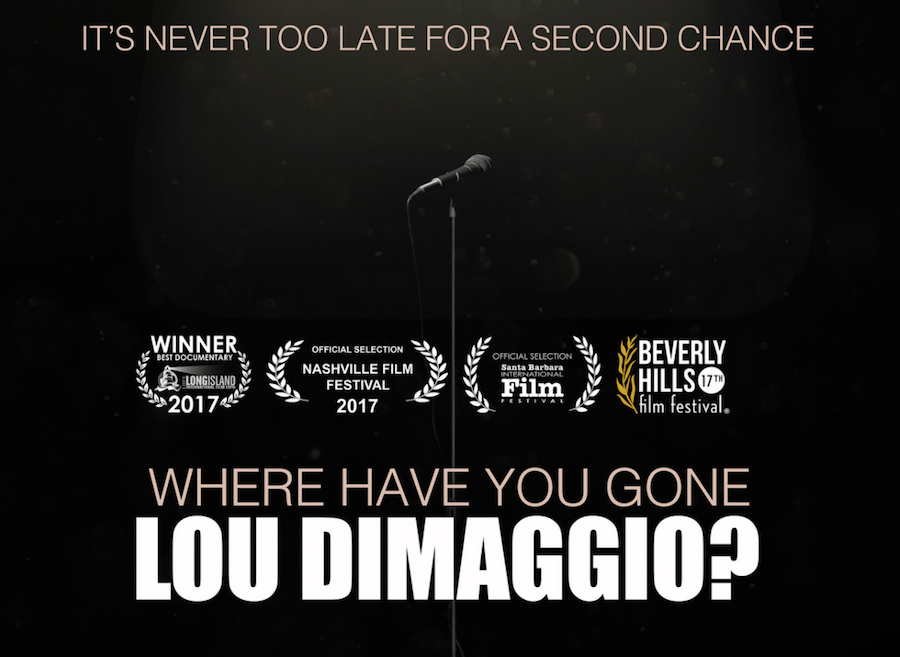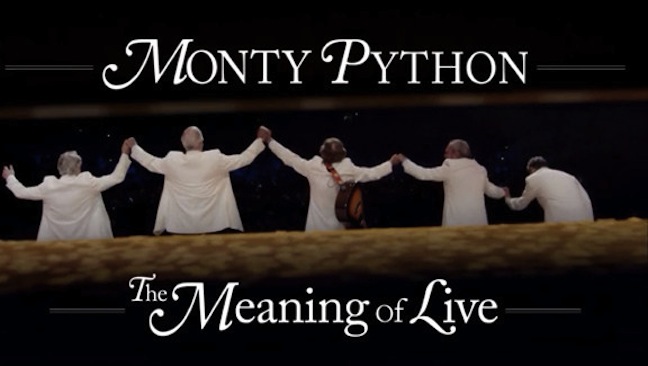Some people quit stand-up comedy. Some people don’t quit until they die. And others just fade away, for a variety of reasons.
What was Lou DiMaggio’s excuse?
That’s one of the questions answered in Where Have You Gone Lou DiMaggio?, a documentary film by Brad Kulhman which opens today in Los Angeles and will become available for streaming On Demand on March 13.
DiMaggio (no relation to baseball stars Joe and Dom, despite the wordplay in the documentary’s title) was a paid regular at Catch a Rising Star in the late 1980s when Catch was the preeminent comedy club in New York City. Or for you kids who can’t remember that far back, this was when Catch held the iconic legendary stature that The Comedy Cellar does today. DiMaggio moved to Los Angeles in 1989 to get that comedy boom money that he’d already seen several of his peers and friends get. And he did. Just not so much onscreen — though he picked up plenty of bit parts in TV shows over the years — and you may have seen his name in the credits for shows with his A-list friends (Seinfeld, Curb Your Enthusiasm). But his energy got refocused into writing, primarily for game shows, winning an Emmy along the way, and he stopped doing stand-up. Twenty years later, DiMaggio’s nagging urge to return to stand-up nudged him enough to give a comeback a try.
Some of his old friends join him in this documentary to talk about the old days at Catch and give him advice on his comedy comeback. Among them: Larry David, Colin Quinn, Suzie Essman, Joy Behar, Jeff Garlin, Ray Romano and Howie Mandel.
Roll the clip!
DiMaggio and director Brad Kuhlman talked to me this week, and DiMaggio revealed that his decision to get back onstage was fueled in part by the filmmaking process.
“Initially I thought we were making a documentary about Catch A Rising Star, and then Brad said, ‘This is all good, but have you ever thought of doing stand-up again?’ And the truth is yeah, I thought about it all the time,” he told me.
DiMaggio realized there’d be no better opportunity for him to give it another shot. Plus: “It made it way more exciting and more accountable” to have a camera crew following him. Especially in scenarios such as a sparsely-attended showcase at UCB Sunset in Hollywood, where “it was more of our crew than them.”
DiMaggio had an opportunity in the 1990s to take a lucrative gig on set at Seinfeld, warming up the live studio audiences and keeping them entertained between takes. He passed.
“You look at those things, those opportunities, in retrospect, you think I should’ve done that. But you can only do that in hindsight. Colin (Quinn) articulated it perfectly” in the film, DiMaggio said. They wanted to make their own TV shows, not serve as assistants for their friends’ shows. “I don’t want people to think of me as a warm-up,” he said.
Kuhlman wanted people to give DiMaggio a second thought.
“Catch is extremely interesting,” Kuhlman said, as a comedy club that was the center of all the comedy action and helped launch big stars. “That’s a great story, but the idea of a character, or a person who is known by all these comedians. It clicked in my head immediately. I saw the film. This guy is known and loved by all the comedians….but ive never heard of him. What’s going on here? It seemed a more interesting layer to this. It also became the mortar in between all these celebrity interviews. It’s also a very active element.
And now?
Without any spoiler alerts, it’s safe to say you shouldn’t be surprised to see DiMaggio on any stand-up lineup around Los Angeles.
“I’m out there and I’m doing it,” he said. “But it’s not easy.”
Ritch Shydner made a comeback of his own in the documentary, I Am Comic, and makes an appearance in Where Have You Gone Lou DiMaggio? DiMaggio said “his advice was something like, make sure you do what you want to do.” DiMaggio has different goals, he said, than Shydner, and might not want to work the road or be, as DiMaggio says, “a lunch-bucket comedian.”
So he’s still looking for writing and acting work while getting back into the flow of stand-up. “I want to do stand-up on my own terms,” he said. “An hour special? Hell yeah!” But that’ll take time, he recognizes.
Kulhman said the film’s message ultimately is: “It’s really never too late to do in life what you really want to do.”
DiMaggio compared himself to Rocky Balboa. At least the early, original Rocky film. “Rocky just wants to go the distance,” DiMaggio said. “I just wanted to get back onstage, and I did it. The end of the film is the beginning of the story.”
Where Have You Gone Lou DiMaggio? already hit the film festival circuit in Santa Barbara, Beverly Hills, Nashville, Long Island, Woodstock and elsewhere.
It screens this week in Los Angeles at Arena Cinelounge.


